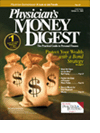Publication
Article
Physician's Money Digest
Are You Facing a Medical Career Crisis?
Author(s):
I think I'll just buy a Chick-fil-A restaurantand retire in 3 years," one discouragedphysician told Vickie Alleman, aSugar Land, Tx-based health care communicationsspecialist. Unfortunately, this isthe sort of sentiment Alleman hears "moreso than you would realize."
But after more than 20 years in themedical field, Alleman understands thefrustration felt by doctors. With risingmalpractice rates, more regulation, longhours, and falling reimbursement, manydoctors face a professional climate inwhich they feel they have little control. Asa result, Alleman has seen the attitude ofphysicians in private practice change drasticallyover the years. Alleman notes, "Ionce heard, ‘How can I make it work?'Now I hear, ‘How can I get out?'"
Worth a Book
Business
Therapy for Doctors: Communication
Skills for the 21st Century
This was just one of the reasonsAlleman decided to write (AllemanCommunications; 2003). Part self-helptome, part business communicationsbook, it addresses both the personal andprofessional challenges many physiciansconfront today. "There are so many outsidepressures coming to bear on privatepractices. It's so overwhelming, physiciansare really losing sight of the big picture,"Alleman says. "My book is really aboutyour career as a doctor."
Essentially, Alleman is trying to helpphysicians move from a reactionary modeto a proactive mode to give them back asense of control. "I want to get them offautopilot, to think strategically about thenext 10 to 15 years," she says.
The frustration can be especiallyacute, Alleman points out, for physiciansin their mid-40s. She writes in her book,"It may take at least 5 to 7 years in medicalpractice for a physician to realize therealities, limitations, and long-term potentialof their earning capacity. Typically,physicians are in their late 30s toearly 40s when they have a more realisticview of their earning potential, aswell as the longevity of their career inmedicine. By this stage of life, the physicianis either satisfied with their choiceto practice medicine or feeling theeffects of burnout."
Weighing the Options
For those feeling burnout, Alleman'smessage is one of empowerment. "Whathappens with doctors is that they start tofeel trapped." But, she emphasizes, "Theydo have options." Options can include achange of career within the field, or simplya change in attitude. And it is this changein attitude, mode of communication, anddecision making that Alleman says canhelp doctors the most.
She writes in her book's introduction,"By identifying their own behavioral patterns,I believe physicians can becomebetter leaders and achieve personal businesssuccess. By focusing on the quality oftheir relationships with each other andtheir employees, I believe that physicianscan create a practice environment thatthey truly enjoy."
One telling example Alleman presentsin the book is a scenario in which an insurancecarrier suddenly decides to signifi-cantly reduce payment premiums. Typically,a physician could rail against thecarrier, write letters, etc. But Alleman suggestsa more positive approach: Acceptthe circumstances you can't control, butfocus on the circumstances you can control.For instance, use the HMO's news asa springboard for eliciting ideas fromstaff to re-evaluate office efficiency,scheduling, and money management.
What's Inside
Business
Therapy for Doctors
Using real-worldexamples, specifically delves intothe following:
- Creating a written"business philosophy"to guide your practice
- Dealing with change
- Leadership qualities
- Focusing on the positive
- Recognizing self-sabotage and itseffect on decision making
- Viewing the practice as a family(dysfunction and all)
- Effective staff management, coveringaccountability, boundaries, and personalityissues
- Deciding whether to join a groupmedical practice
- Understanding patient market pro-files of different generations
- Coming to terms with changes likealternative medicine and the Internet
- Understanding how your relationshipwith money affects your decisions
- Realizing the differences betweensuccess and goals
Business Therapy for Doctors
is availablefor purchase through Alleman Communications(281-313-0711; www.allemancommunications.com).
